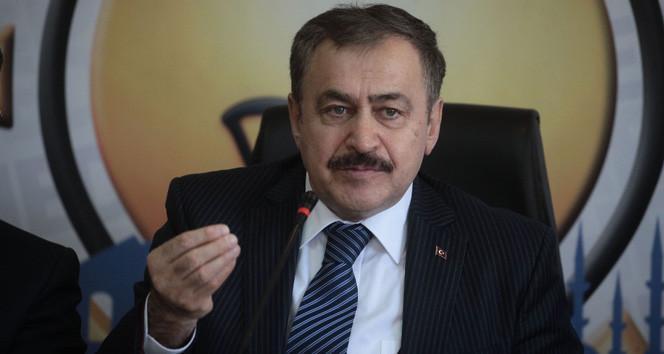Gov’t forced to take measures amid below average rainfall across Turkey
Merve Erdil – ISTANBUL

The government is trying to take all necessary measures against a possible drought in 2018, following rainfall in 2017 that was far below the annual average, Water Affairs and Forestry Minister Veysel Eroğlu has said.
“A meeting, under my chairmanship, is scheduled for April to discuss contingency plans. We will also assess water levels in all dams that provide drinking water at the meeting,” Eroğlu told Hürriyet.
Last month, he had said Turkey experienced the worst drought in 44 years in 2017.
The water level in the country’s dams has plunged due to this substantial decline in rainfall, prompting concerns that a potential drought could pose serious risks this year.
“According to our projections, the amount of rainfall this year will be close to the long-term average. However, the amount of rainfall was particularly low between Oct. 1 and Jan. 16 across Turkey,” Eroğlu said, adding that southern Anatolia was the worst affected region as rainfall there plunged as much as 57 percent.
“The eastern Anatolia and central Anatolian regions suffered from lack of rain, while rainfall in the Aegean region was also down 18 percent,” the minister added, noting that the other three major regions - the Marmara, the Black Sea and the Mediterranean - are not experiencing such extreme conditions.
Eroğlu said water levels in drinking-water dams is currently 33.6 percent.
“We will do everything to make sure there is no drinking water shortage. This is our priority. We have solved the cities’ drinking water problem by building 193 drinking water facilities across the country,” he added, vowing that industrial facilities will continue to receive an uninterrupted supply of water.
Land irrigation
Eroğlu also warned that wild flooding irrigation methods employed by some farmers was causing some problems.
“We actually have enough supply of irrigation water. We spent 2 billion Turkish Liras on delivering water to the plains of Şanlıurfa for irrigation, but the farmers there are just wasting the water. We need to make them understand that over-irrigation has serious consequences,” he said.
“We will deliver the water to their land plots, but it is their responsibility to install the sprinkling and dripping irrigation systems. Our ministry will provide financial assistance to all the farmers who set up such systems,” Eroğlu added.
Dams for water storage
Asked about a recent warning made by the Foundation for Combating Soil Erosion, for Reforestation and the Protection of Natural Habitats (TEMA) that Turkey will become a water-poor country by 2030, Eroğlu dismissed the claims.
“First of all, TEMA did not carry out any scientific study on this matter. What’s more, it was not TEMA itself but rather a representative from TEMA that made this rather vague comment, which in fact is not true,” he said.
“Of course, we are not a water-rich country, but we can become self-sufficient, as Istanbul has demonstrated. It is crucial to have an effective water resources management system. Istanbul suffered from water shortages for 100 years but it does not anymore. The city now receives less rainfall but it is not experiencing any water shortages. Why? Because we handle the water management task adequately there,” Eroğlu said.
Rainfall in Turkey is well below the world average, which necessitates construction of dams for storage, the minister also noted.
“Turkey receives almost no rain during the summer season, when the need for water reaches its peak because of irrigation activities. That is why we need to collect water during the wet winter and spring seasons in dams to be used later in the dry summer season. We meet this demand by building dams,” Eroğlu said.
Turkey currently uses up to 74 percent of its water resources in irrigation activities.
Meanwhile, Minister Eroğlu also urged local municipalities across the country to improve infrastructure in order to reduce high water leakage rates, which he said in some cases reach up to 60 percent.
New regulations will be introduced obliging municipalities to bring down the water leakage rate to a maximum of 30 percent over the next four years, he added.
















